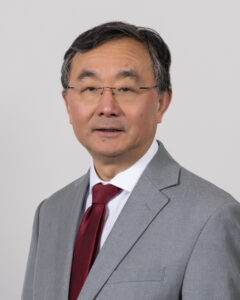Cancer remains one of the most significant health challenges, with millions of new cases each year. In the US alone, roughly 1.8 million new cancer cases are diagnosed annually, and the vast majority (~90%) of these are solid tumors (cancers of organs such as the breast, lung or colon).

Founder, Chairman, CEO and CSO
OncoC4
Globally, cancer incidence is on the rise. The WHO projects that the annual number of new cancer cases will increase from about 20 million in 2022 to over 35 million by 2050, contributing to a growing worldwide healthcare burden.
Alongside this increasing cancer burden, innovative treatments are progressing swiftly. Among these, immunotherapies — therapies that harness the body’s immune system to fight cancer — have emerged as a promising approach against many tumor types. The market for such novel cancer therapies is projected to grow substantially in the coming years. For example, recent analyses forecast that global cancer immunotherapy revenues will more than double from roughly $155 billion in 2023 to an estimated $378 billion by 2030, underscoring the optimism and investment in next-generation cancer treatments.
OncoC4 is at the forefront of this evolution in oncology research. By harnessing decades of basic research in immuno-oncology, OncoC4 is pioneering approaches that focus on the science behind tumor microenvironment modulation.
In this Xtalks Clinical Edge™ interview, Dr. Yang Liu, Founder and CEO of OncoC4, offers his insights on the challenges and opportunities in developing first-in-class therapies and highlights the innovative strategies shaping the future of immuno-oncotherapy.
Xtalks Clinical Edge™: Issue 4 — OncoC4’s Approach to Immuno-Oncology Trials
Xtalks Clinical Edge™ is a magazine for clinical research professionals and all who want to be informed about the latest trends and happenings in clinical trials. This magazine immerses you in a world where industry leaders, patient advocates and top researchers converge to provide the most insightful perspectives on clinical trials.
A Scientific Journey Rooted in Fundamental Research
Dr. Liu brings more than three decades of fundamental research in immuno-oncology to his leadership role. His earlier work on T-cell co-stimulation established the foundation for insights that have since influenced the field of cancer immunotherapy.
By examining the interactions between members of the B7 family and their receptors, such as CD80 (B7-1) and CD86 (B7-2) with CD28 and CTLA-4, Dr. Liu and his team demonstrated that pathways traditionally believed to operate solely in lymphoid organs also have a vital role in the tumor microenvironment. This finding has guided OncoC4’s strategy of targeting therapeutic interventions to areas where they can achieve greater efficacy with reduced systemic toxicity.
Building on these foundational insights, Dr. Liu’s research has continually enhanced our understanding of immune regulation in cancer. His work not only redefined the role of key immune checkpoints but also illuminated how localized modulation of the tumor microenvironment can facilitate strong anti-tumor responses.
This scientific journey, rooted in rigorous basic research, has been pivotal in creating innovative therapeutic strategies. It emphasizes the importance of converting deep mechanistic insights into practical clinical advancements that can ultimately benefit patients with solid tumors.
Focusing on the Tumor Microenvironment
Dr. Liu’s approach is clear: targeting the tumor microenvironment can improve therapeutic outcomes by sparing normal physiological functions. One compelling example he discusses involves a bispecific antibody engineered to simultaneously block PD-1 — an immune checkpoint receptor expressed on T cells — and VEGF, a key angiogenic factor that drives blood vessel formation throughout the body.
In the tumor microenvironment, both PD-1 and VEGF are co-enriched, and their interaction contributes not only to immune evasion but also to the vascular support that tumors require. By inhibiting both PD-1 and VEGF, this bispecific antibody is designed to reinvigorate T-cell responses while also disrupting angiogenesis, thereby effectively “starving” the tumor and reducing its capacity to grow.
This precision in targeting may ensure that while the therapy can work robustly where it is needed, adverse effects on normal tissues are minimized. Moreover, by simultaneously disrupting multiple pro-tumorigenic signals, such bispecific antibodies can overcome resistance mechanisms that often limit the effectiveness of single-target therapies.
Another innovative strategy described by Dr. Liu involves a next-generation anti-CTLA-4 antibody, which is specifically engineered to deplete regulatory T cells — cells that typically suppress immune responses — directly within the tumor. This localized depletion is critical because it can help shift the balance of the immune milieu from suppression to activation, thereby enabling other immune cells to more effectively recognize and attack cancer cells.
By focusing the antibody’s effects within the tumor microenvironment, this approach may not only enhance the immune system’s capability to fight the tumor but could also achieve a better therapeutic index, as systemic toxicity may be reduced and normal immune functions in other parts of the body could be maintained.
Additionally, these strategies underscore a broader trend in immuno-oncology where therapies are becoming more refined. By focusing on the unique characteristics of the tumor microenvironment, researchers could create treatments that not only elicit strong anti-cancer responses but also may provide enhanced safety profiles — an essential factor in successfully translating innovative therapies from the lab to the clinic.
Harnessing Novel Immune Checkpoints: The SIGLEC10/CD24 Axis
A key area where OncoC4’s research is breaking new ground is in targeting the CD24-SIGLEC10 immune checkpoint. Tumors often overexpress CD24, a molecule that interacts with SIGLEC10 on immune cells, such as macrophages, delivering a “don’t eat me” signal that allows cancer cells to evade immune destruction.
“The Irving L. Weissman group was the first to demonstrate that the interaction between CD24 and SIGLEC10 regulates a ‘do-not-eat-me’ signal in the tumor microenvironment, effectively preventing macrophages from attacking tumor cells,” Dr. Liu explains further.
This observation highlights how blocking this interaction can improve the ability of macrophages, T cells and natural killer (NK) cells to recognize and eliminate tumor cells.
OncoC4 has translated this scientific insight into a therapeutic strategy with its first-in-human (FIH) anti-SIGLEC10 antibody. By specifically targeting SIGLEC10, this approach is designed to disrupt the CD24-SIGLEC10 interaction, thereby reactivating the innate immune response against cancer.
Early clinical evaluations are now underway, reflecting the promise of this strategy in overcoming tumor immune evasion while minimizing off-target effects.
Navigating the Challenges of First-in-Class Therapies
Developing first-in-class therapeutics is inherently risky because these drugs tread uncharted territory in clinical research.
Dr. Liu emphasizes that one major hurdle is ensuring rigorous preclinical validation, particularly when the target — such as SIGLEC10 — exhibits complex biology that can differ between experimental settings and human patients. This challenge requires sophisticated preclinical testing to assess both efficacy and safety before clinical trials.
Moreover, regulatory agencies also play a critical role in this process. Given the novelty of first-in-class therapies, regulators such as the FDA require cautious progression through dose-escalation studies to ensure patient safety. This means initiating treatment at lower doses and carefully monitoring for adverse events — a process that, while time-consuming, is essential for mitigating risks.
The Power of Collaboration and Innovative Culture
Dr. Liu’s insights also emphasize the crucial role of collaboration in the biotech industry. For example, OncoC4’s strategic collaboration with BioNTech has been essential in leading the clinical development of its lead anti-CTLA-4 program.
This synergistic relationship helps OncoC4 expedite the development of its next-generation anti-CTLA-4 antibody through clinical phases while maintaining strong safety and efficacy standards. The combined strengths of OncoC4’s innovative research and BioNTech’s established infrastructure are facilitating a more efficient translation of breakthrough science into effective cancer therapies.
At the heart of OncoC4’s success is a team united by a shared passion for improving cancer outcomes. Dr. Liu’s leadership emphasizes a balanced environment where rigorous scientific investigation is matched with the agility and creative problem-solving characteristics of a dynamic startup.
This culture not only drives the discovery of novel therapeutic approaches but also supports the exploration of new applications, such as extending the impact of immune modulation to neurodegenerative diseases.
By advancing our understanding of the tumor microenvironment and harnessing the power of innovative immunotherapies, researchers like Dr. Liu are paving the way for a new era in oncology — one that holds the potential to significantly improve patient outcomes and reshape the future of cancer treatment.













Join or login to leave a comment
JOIN LOGIN